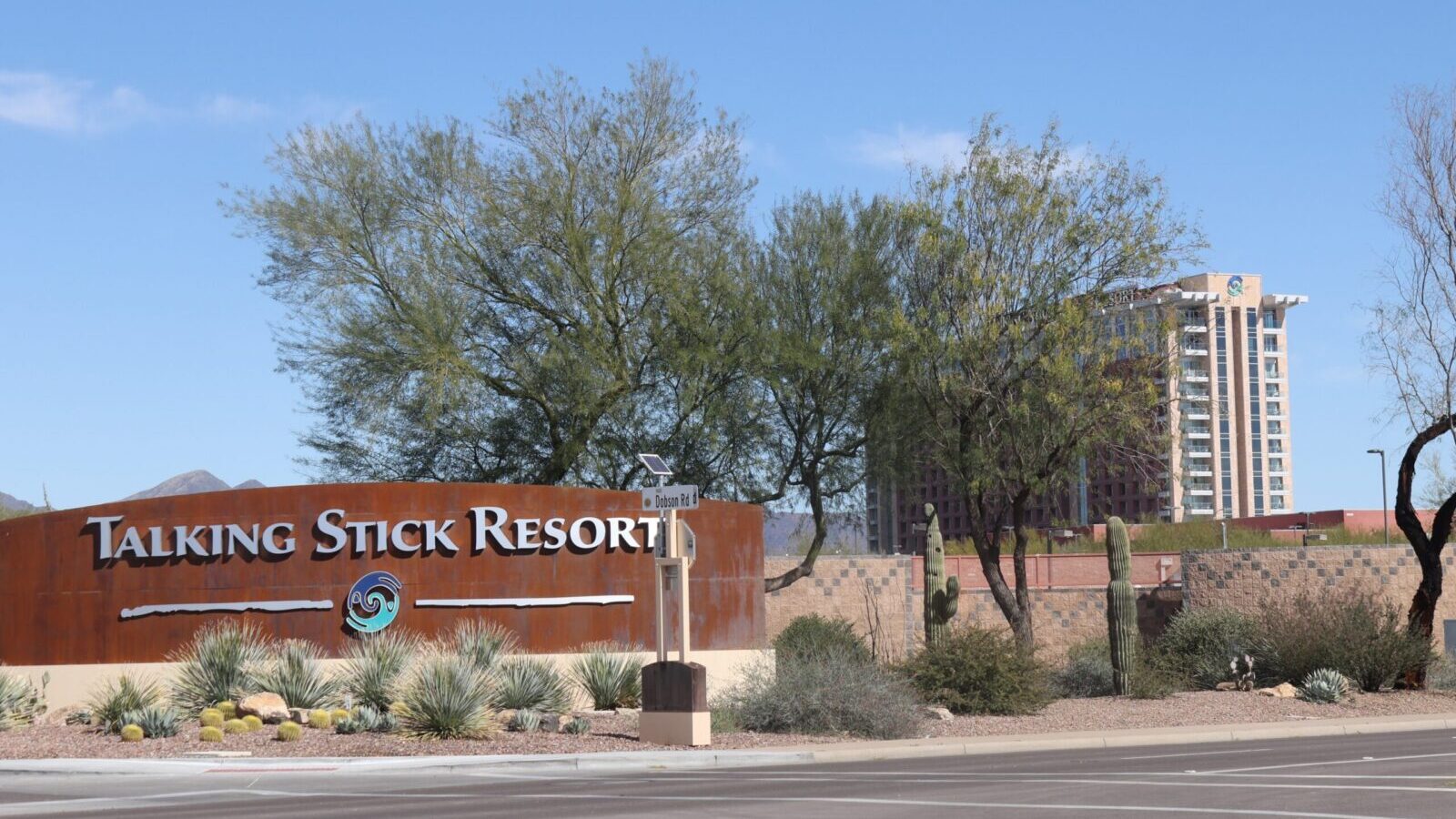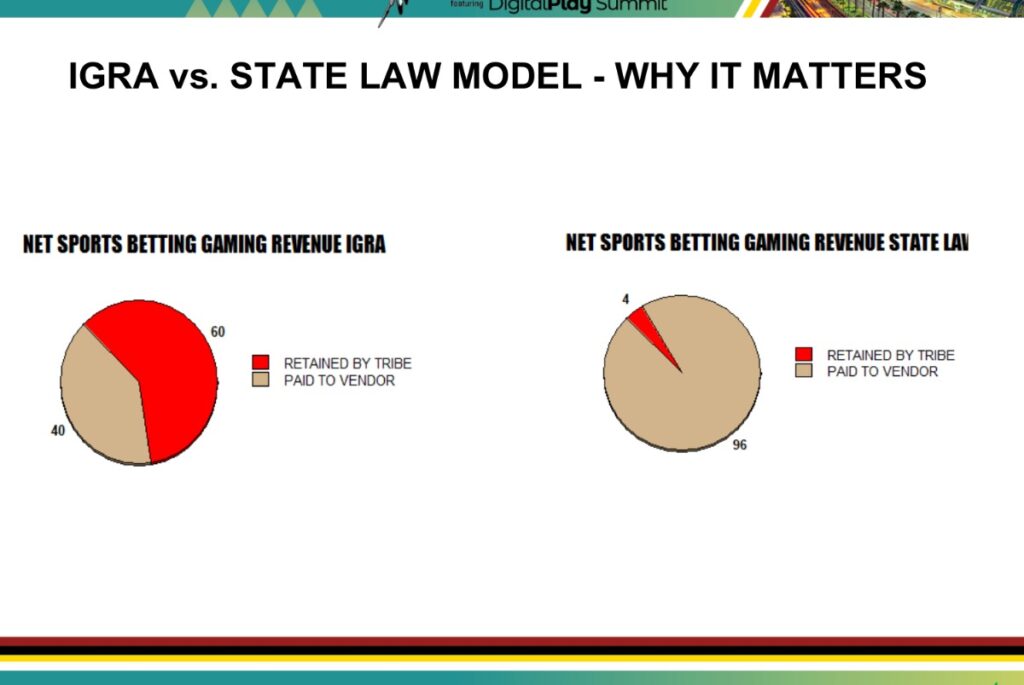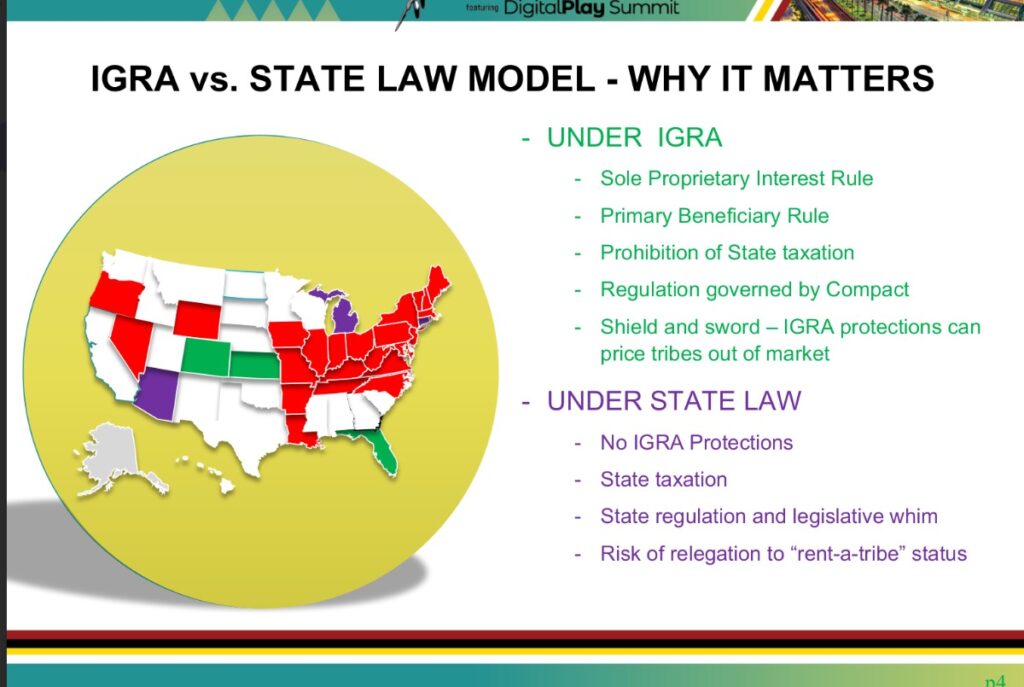IGA Panel: Tribes Can Make A Lot More Money Under IGRA Vs. State Regulation
IGRA affords protections that agreeing to state regulation cannot
3 min

SAN DIEGO — Tribal nations can earn 15 times more revenue using a digital sports betting model under the Indian Gaming Regulatory Act (IGRA) vs. being regulated by a state, according to Scott Crowell and Stephen Hart, tribal attorneys who presented at the Indian Gaming Tradeshow & Convention Monday.
For tribes, the issue of whether or not to be regulated by a state has long been discussed. In the 29 states that offer digital wagering, Indian Country in three chose to be regulated by their states. So far, only the Florida Seminoles are offering online betting under an IGRA model. Operating under that model, according to the panelists, means a tribe has exclusivity to gaming, is not taxed by the state, and commands 60 percent of digital betting gaming revenue. Tribes in Colorado are currently fighting in court for this right, and tribes in Kansas are not yet live.
But in Indian Country in Arizona, Connecticut, and Michigan, tribes opted to be regulated by their respective states. The reasons behind those decisions vary, though speed to market was a likely factor in all.
Michigan’s tribes in March 2020 launched alongside commercial operators. They were the first tribes to agree to state regulation and the first offer statewide online betting anywhere in the U.S. Arizona’s tribes were next in September 2021, followed by Connecticut’s tribes in October 2021.
In all cases, the tribes contract out their sports betting operations to national or regional betting operators. According to the panelists, the tribes get 4 percent of revenue vs. the 60 percent mandated under IGRA.

The Arizona example
In Arizona, lawmakers sought “parity” when they legalized sports betting. They capped the number of licenses in the state at 20, and assigned 10 each to professional sports franchises and Indian Country. The division has proven to be inequitable. There are so far only seven professional sports teams in the state that could qualify for licenses, but there are more than 20 tribes. Currently, seven of the tribal licenses are in use, but the number has been as high as 10.
Because of the license caps, qualified professional sports teams were all but guaranteed to get a license. Tribes, conversely, competed against each other for the available licenses.
The net result was the the biggest national operators partnered with professional sports teams. Bet365 and Fanatics Sportsbook are the biggest operators with tribal partners. The remaining tribes are partnered with smaller and/or speciality operators. Most recently, BetCris via Plannatech (San Carlos Apache Tribe) and Sporttrade (Quechan Indian Tribe) got licensed.

Some tribes have lost partners due to attrition or contraction in the number of available operators.
According to the panelists, Arizona tribes reap 5.58 percent of the state’s total gaming revenue, 96 percent of which goes to the operators. Under an IGRA model, the tribes would get 10 times that amount of revenue.
Look back before proceeding
As the 2025 legislative season winds down, three major tribal gaming states will go at least another year without legal sports betting. Lawmakers in Minnesota were again unable to come to a deal, while Indian Country in Oklahoma remains at odds with Gov. Kevin Stitt, who has proposed a deal that would give tribes retail betting but open digital wagering to others. In California, legalization will likely come through a ballot initiative that is at least three years away.
Tribes in all three states now have the benefit of looking back at what their peers have done elsewhere, and can use that knowledge to inform what legal betting will look like.
Minnesota lawmakers and tribes appeared in 2025 for the first time to be in agreement with a framework, but outside factors derailed the process. Oklahoma tribes have long said they will wait for Stitt to term-limit out in 2026 before making a move. When they do, it’s likely they will push for legalization via IGRA.
California will be ‘complicated’
In California, during a discussion at the IGA convention, the question of whether to legalize within or without IGRA was broached. Tribal leaders note that IGRA is not a perfect situation, but it does provide critical protections and safeguards sovereignty. Given the size and complexity of the California market and the number of tribes involved, a commercial solution could potentially be considered.
But commercial contracts come with risk, the panelists said, including giving up exclusivity, being taxed by the state, and the “risk of relegation to ‘rent-a-tribe’ status.”
From an operator standpoint, California, with a population of 40 million, is the prize. David Katz of Jefferies Equity Research wrote in a research note Wednesday that the California market will be “complicated” given the number of tribes and questions about how legalization will occur. Writing on DraftKings specifically, Katz rated the company a buy after Casino Reports wrote that the tribes and national operators are “in talks.”
But the market could potentially be smaller than operators are hoping for if California’s tribes choose to legalize under IGRA vs. using a commercial model.
“Using NY’s $129 GGR per capita as a benchmark, we estimate CA’s total OSB market to be in the ~$3.7B range, although we expect the share of the revenue could lean in favor of the tribes, per comments in the reports,” Katz wrote. “By splitting the ~$3.7B hypothetically 65% tribes/35% operators implies that the theoretical market available to all operators would be ~$1.3B. Assuming DKNG takes ~30% market share in the state (vs. ~31% nationally in FY24) implies ~$388M in actual GGR, compared with the ~$410M DKNG saw in IL in FY24.”
Though Katz was writing about California and just DraftKings, his projection model, as Crowell and Hart discussed, would hold true for any operator under an IGRA legalization model.
Operators or tribes that are regulated by the state are also subject to “state regulation and legislative whim.” Operators in Illinois and Ohio have experienced this firsthand, as both states have significantly raised tax rates — Ohio within six months of launch.






